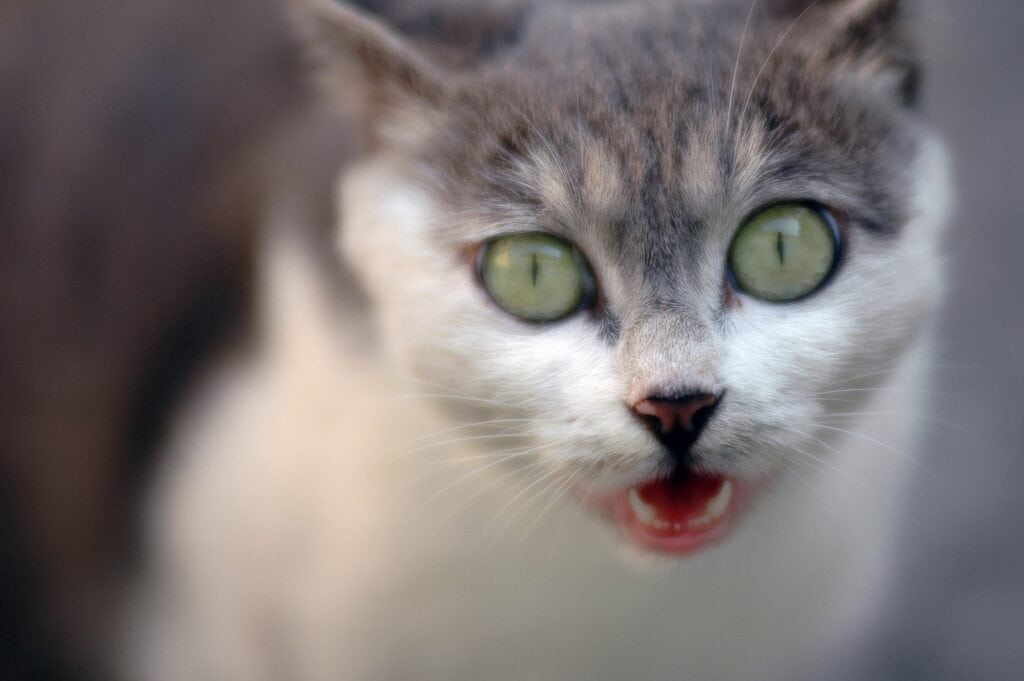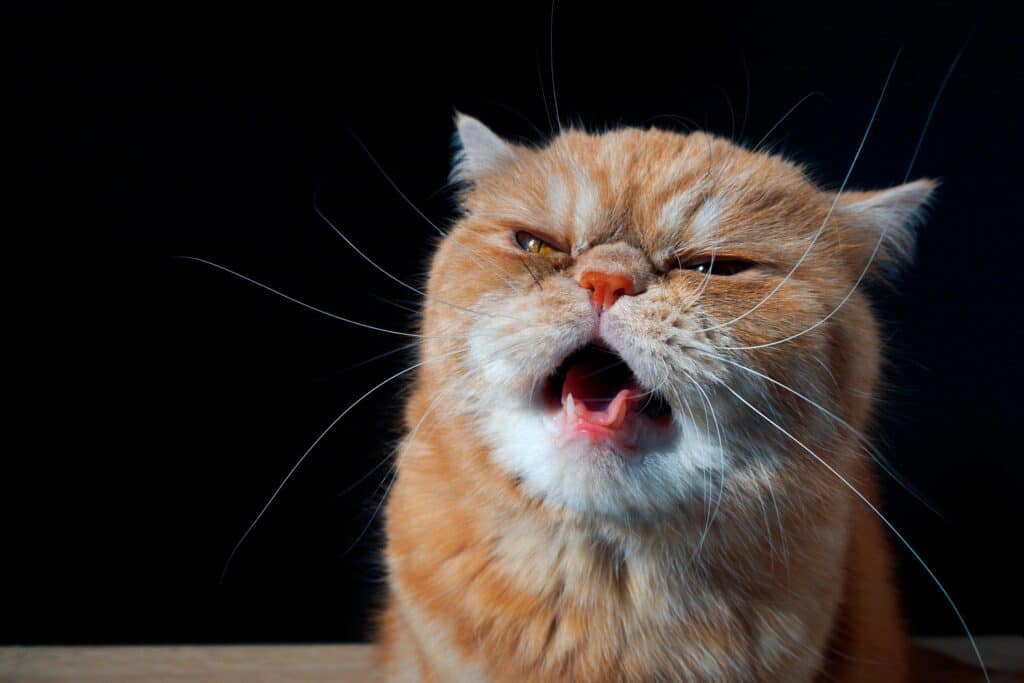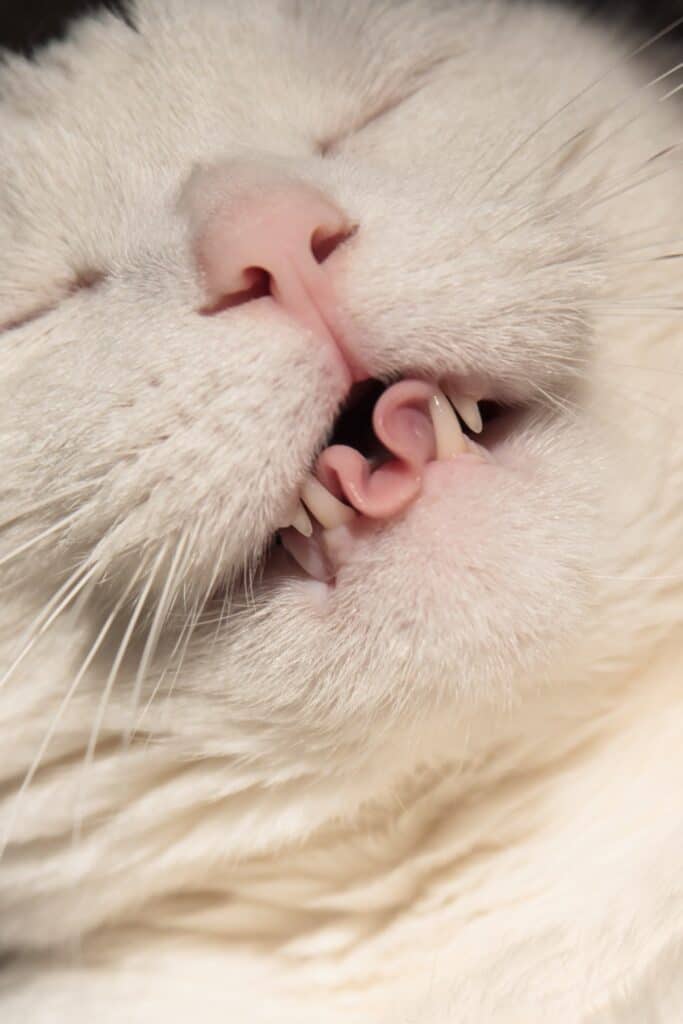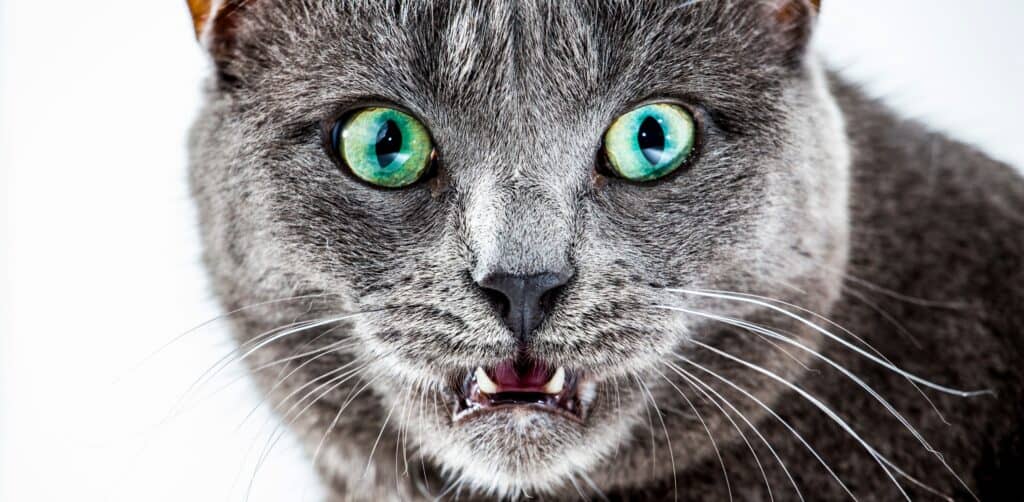In the world of cat parenthood, it’s not uncommon for our feline companions to exhibit behaviors that leave us scratching our heads.
One such behavior is heavy breathing, which can range from slightly peculiar to potentially alarming. If you are asking “My cat is breathing heavy, do I need to be worried”, then you have come to the right place.
Breathing problems in cats can be life-threatening if left untreated. This guide is here to provide the necessary insights and guide you through the steps to take when you find your cat breathing heavily.
From understanding its possible causes, identifying when it’s an emergency, and what to expect from a veterinary visit, this article aims to arm you with the knowledge needed to ensure your cat’s wellbeing.
My Cat Is Breathing Heavy: Defining Heavy Breathing in Cats
Heavy breathing in cats is when a cat breathes rapidly with an open mouth or with obvious effort.
Not all heavy breathing is cause for concern, but recognizing the difference between normal and abnormal breathing patterns is critical for identifying potential health problems.
Normal Breathing
In terms of normal breathing in healthy cats, there are three key aspects to consider.
Firstly, the normal rate of breathing, which in a healthy cat is typically between 20 to 30 breaths per minute.
Secondly, the depth of each breath, which is normally quiet and requires minimal effort with the movements of the chest being barely noticeable.
Lastly, the consistency of the breathing pattern is important. Under normal circumstances, a cat’s breathing is steady and rhythmic, which is indicative of a relaxed and content state.
Abnormal Breathing
Abnormal breathing is distinct from the slow, shallow breaths that a cat takes when at rest.
Abnormal breathing patterns include:
- Rapid breathing (Tachypnea): This is a breathing rate significantly higher than the normal range (the number of breaths the cat takes is more than 30 per minute). It may or may not be accompanied by open-mouthed or labored breathing.
- Labored Breathing (Dyspnea): This is a visible effort or struggle during breathing, with pronounced chest movements. Dyspnea is often accompanied by open-mouthed breathing.
- Open-Mouthed Breathing (Panting): Panting is uncommon in cats. While dogs pant normally as a means of cooling themselves, cats usually do not pant unless there is something wrong.
While rapid breathing and panting are not normal in calm, relaxed cats, there are certain situations where they might be expected to occur. For example, cats may pant after strenuous exercise or during moments of extreme excitement.
It is the frequency and duration of these abnormal breathing patterns that is important. In normal cats, these breathing patterns should return to normal quickly once the excitement or exertion is past and the cat is at rest.
If your cat is at rest and displays tachypnea, dyspnea, or panting, or has the following symptoms, then it is important to seek medical attention as soon as possible:
- Noisy breathing
- Gagging or coughing
- Bluish gums or tongue
- Struggling to breathe while resting

10 Possible Reasons For Heavy Breathing In Cats
Heavy breathing in cats has many possible causes, ranging from normal physiological responses to underlying health issues.
The important thing is to observe your cat closely to determine if the heavy breathing is abnormal and if you should be worried about it.
Here are several reasons why a cat may be breathing heavily:
- Overexertion or Physical Activity:
- After intense play, exercise, or a period of vigorous activity, it’s normal for a cat to have heavy or fast breathing. This is the body’s natural response to help regulate body temperature and replenish its oxygen deficit. However, it should subside once the cat has had a chance to rest.
- Stress or Anxiety:
- Cats may pant or breathe rapidly when stressed, anxious, or frightened. Unfamiliar environments, loud noises, or interactions with other animals can trigger this response.
- Heat or Overheating:
- Unlike dogs, who readily pant to help regulate their body temperature, panting is not a normal cat characteristic. The more common method cats use to cool themselves is to find fresh water and a cool place to rest. However, cats will pant when they are very overheated.
- Respiratory Infections:
- Infections affecting the respiratory system, such as feline upper respiratory infections (URI), can lead to heavy breathing. Other symptoms may include coughing, sneezing, and nasal discharge.
- Viral infections are the most common respiratory infection in cats but can also lead to secondary bacterial infections.
- Heart Disease:
- Cardiac issues, such as heart failure, cardiomyopathy, or heartworm disease can result in difficulty breathing. The weakened heart is less efficient at pumping blood, resulting in decreased oxygen delivery to vital organs and tissues.
- The heart may also fail to efficiently pump blood out of the lungs. This can cause fluid to accumulate in the lungs, a condition known as pulmonary edema. The presence of excess fluid in the lungs makes breathing more challenging for the cat.
- To compensate for the reduced oxygen supply, the cat may exhibit rapid and labored breathing as the body attempts to take in more air. This increased respiratory effort is a response to the decreased oxygenation of the blood.
- Obesity:
- Obesity in cats can lead to heavy breathing primarily due to the additional strain it places on the cardiovascular and respiratory systems.
- Allergies:
- Cats can develop allergies to different environmental factors, such as pollen, dust, fragrances, or certain foods. Allergic reactions can present themselves as labored breathing, along with other symptoms like itching, wheezing, or sneezing.
- Asthma:
- Feline asthma is a common respiratory condition in cats. The most common symptoms of asthma are labored breathing, wheezing, and coughing.
- Trauma or Injury:
- Physical trauma or injuries, such as a fall or impact that injures the chest, or lungs, or causes severe pain, can lead to heavy breathing. In these cases, immediate veterinary attention is necessary to assess and address any internal injuries.
- Dental Problems:
- Severe dental issues, like infections or abscesses, can cause discomfort and difficulty breathing. Cats may breathe heavily as a response to pain or as a result of nasal congestion.
When Is It An Emergency?
Heavy breathing in cats can be a cause for concern, and in certain situations, it may indicate a medical emergency requiring immediate veterinary care.
Seek immediate veterinary attention if you observe the following signs, as they may indicate a serious and potentially life-threatening condition:
- Open-mouth breathing that is not related to exercise or a stressful situation
- Cyanosis, which is a bluish or grayish discoloration of your cat’s gums, tongue, or other mucous membranes that indicates the cat is not getting enough oxygen.
- Severe labored breathing that persists for an extended period without improvement.
- Sudden onset of heavy breathing with no apparent cause such as recent physical activity or stress.
- Heavy breathing accompanied by weakness, collapse, or an inability to stand or walk.
- Heavy breathing that occurs after trauma or injury.
- Struggling to breathe comfortably while resting.
If your cat is showing these signs, reach out to your veterinarian or an emergency veterinary clinic immediately. Explain the symptoms you’re seeing and follow their instructions. They may advise you to bring your cat for immediate evaluation and treatment.
Remember that rapid and appropriate intervention can significantly improve the chances of a positive outcome in emergency situations. If in doubt or if you notice any of the mentioned emergency signs, it’s better to err on the side of caution and seek professional veterinary help promptly.

What Do I Do If My Cat Is Breathing Heavy?
How long has your cat been breathing heavily?
If your cat just started breathing heavily, it’s important to consider the context. Has your cat been engaging in heavy exercise, or has it recently been frightened or stressed?
If so, the first step is to provide a calm and quiet environment for your cat to relax. Reduce noise and activity around your cat and observe its behavior closely.
Has the heavy breathing subsided after resting in a calm environment?
If your cat’s heavy breathing decreases after a period of rest in a quiet setting, it may have been a temporary response to stress or exertion.
However, if the heavy breathing persists, or if your cat shows other symptoms like coughing, wheezing, or appears lethargic, it’s important to consider other causes that require medical intervention.
When is action needed?
Monitor your cat for any other signs of distress, such as changes in appetite, unusual vocalizations, or difficulty in finding a comfortable position to rest. Keep a close eye on its breathing pattern.
If you notice any concerning signs, contact your veterinarian for advice. They may recommend bringing your cat in for an examination to identify the underlying cause and provide appropriate treatment.
When is it a medical emergency?
If your cat appears to be struggling to get enough air, if you notice a bluish tint to its gums or tongue, if it appears to be in severe distress, or if it seems to be losing consciousness, seek veterinary care immediately.
It’s also essential to take your cat to the veterinarian immediately if heavy breathing occurs after a traumatic event or injury.
Respiratory issues can escalate quickly and become life-threatening. Don’t delay seeking medical attention when needed. An accurate diagnosis of your pet’s condition early on can save its life.
How Will the Vet Treat My Cat’s Breathing Issues?
When a veterinarian treats a cat that is breathing heavily, their approach typically involves several steps:
- Initial Assessment: The veterinarian will first conduct a thorough physical examination to assess the cat’s condition, listen to its lungs and heart, and check for any signs of distress or underlying health issues.
- Diagnostic Tests: Depending on the initial findings, the vet may recommend diagnostic tests such as blood work, chest X-rays, or an echocardiogram. These tests help in identifying the root cause of the heavy breathing, whether it’s a respiratory issue, heart problem, or something else.
- Stabilization: If the cat is in respiratory distress, immediate steps will be taken to stabilize its condition. This may include administering oxygen therapy, fluids, or medications to ease breathing and reduce any associated stress or pain.
- Specific Treatment: Based on the diagnosis, the veterinarian will provide targeted treatment. This can range from antibiotics for a respiratory infection, bronchodilators for asthma, heartworm treatment, to more specialized treatments for heart conditions or other serious illnesses.
- Monitoring and Supportive Care: The more serious cases need to be monitored closely, either in the clinic or at home. The vet will provide instructions on how to care for your cat, which might include administering medication, monitoring breathing and activity levels, and making dietary adjustments.
- Follow-up: Regular follow-up visits may be necessary to monitor the cat’s progress and adjust treatment as needed.
The goal of treatment is to address the underlying cause of the heavy breathing while providing relief from symptoms and improving the cat’s overall quality of life.
Conclusion
Heavy breathing in cats is a symptom that should never be ignored.
While occasional panting or heavy breathing may be normal after exercise or during stressful situations, persistent heavy breathing, especially when accompanied by other signs of distress, could indicate a serious health issue.
Remember, prompt veterinary care could mean the difference between a manageable condition and a severe health crisis. Your cat’s health and wellbeing are in your hands, and their quality of life is worth every effort.
Disclaimer: This article is intended for informational purposes only, and does not constitute medical advice. Always consult your veterinarian if you have specific concerns about your pet’s health.


